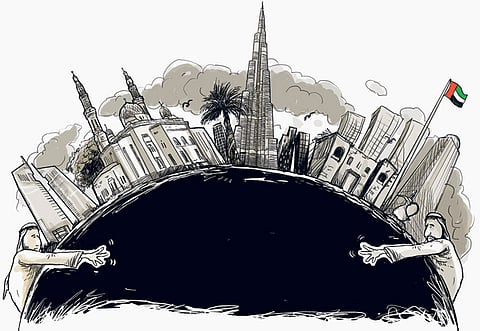UAE's civil society is weak
Disparate groups of committed citizens do not add up to a national dialogue

The UAE does not have many institutions to foster an active civil society. The country has many diverse sets of active citizens working on their specific interests, often to great effect, but these different activities do not come together into one coherent national dialogue. The Federal National Council (FNC) performs its role at the centre of government as a monitor of legislation, but an FNC debate is very different from a widespread dialogue.
Only one generation ago the UAE was a much smaller country, in which UAE citizens were able to operate as a coherent social body as they had for centuries. But today these traditional ways of keeping everyone in touch and articulating public opinion have failed thanks to the very rapid growth of the population of UAE nationals, and their becoming part of a much larger total population.
The UAE's major cities have jumped in one generation from being small villages where social communication was quick and easy, to large cities where it is hard for people to meet each other. Today there is a fragmented array of different social conversations. A few majlises may open at particular times, or mosques can act as their traditional focus for the neighbourhood, but these gatherings of like-minded people do not often interact.
This means that the UAE needs to build a new civil society, so that its citizens can interact with each other in the much larger UAE that exists today. The institutions in which this discussion can flourish have yet to take off, but there is widespread encouragement of people who commit to society. The Abu Dhabi Awards 2010 this week complimented people who had made special efforts in various social bodies, and Dubai and most other emirates have similar awards.
The whole country is aware that it wants committed citizens to take an active part in their society and such community activism is an important start. It generally focuses on particular social campaigns or needs helping the disadvantaged, supporting renewable energy, stopping waste but from people who commit in this way, a wider social dialogue is underway.
What needs to improve is that UAE society needs this kind of dialogue to be active and to be public. This means that the media have a very important role to play. They need to take a lead in making sure that the whole of society knows what the few activists are doing on their many different fronts. Only the media can fill that role once the close-knit, village neighbour style of communication has failed.
It is important that society appreciates those who get involved, and also that those who want to get involved know that they have a role that is valued by people at large. Otherwise it is all too easy to switch off, cease to care about society at large, and become totally self-centred.
Up to the young
One of the most potent forces in the Arab world, which has not been properly recognised for the power that it is, is the increasing number of young people who focus solely on their professional careers, and aim to improve their quality of life. In the 1960s or 1970s, many Arabs would identify themselves by their political allegiance: they would be proudly Arab nationalist, or Palestinian, or support the Muslim Brotherhood. At heart this kind of commitment was about seeking to improve society, as most politics should be.
Today many do not think that way. One example is an Egyptian friend who has lived in the Gulf for many years, and watched his children grow up and seek careers. His own social commitment tending to political activism has not been reflected in the next generation, and he is watching with some surprise his children aiming to become successful professionals, earning enough to improve their lot in life and to support their families, without a political element in their ambitions, without showing a wider concern about where society is going.
This is one example of something that is happening all over the Middle East, as the growing middle class becomes more significant. This trend is the subject of a book published recently by Vali Nasr called Forces of Fortune, which looks at the social ambitions of what he calls the new Muslim middle class. He recognises that there is a widespread desire for a cultural transformation in the Muslim world, but he thinks that "the change agent in the Muslim world is not some enlightened cleric or an enlightened liberal intellectual, but is the businessman. It's the middle class. It's the entrepreneurs. The change agent in the Muslim world will have to be the market, not a cultural debate".
The next few decades will be a time of great change. Huge forces are at work as social commitment clashes with pursuit of wealth; religious ideas jostle with secular thought; protectionists attack globalists. All these issues will be decided by the huge number of under 25s who will grow up to take over. They will need to articulate their hopes and fears, and need to do so in public, so the widest audience can join the debate.


